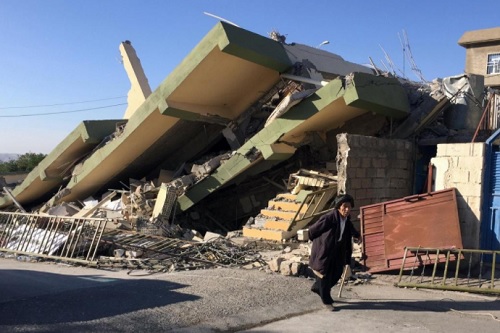BAGHDAD/ANKARA (Reuters) - At least 332 people were killed in Iran and Iraq when a magnitude 7.3 earthquake jolted the region on Sunday, state media in the two countries said, and rescuers were searching for dozens trapped under rubble in the mountainous area.
State television said more than 328 people were killed in Iran and at least 2,500 were injured. Local officials said the death toll would rise as search and rescue teams reached remote areas of Iran.
The earthquake was felt in several western provinces of Iran but the hardest hit province was Kermanshah, which announced three days of mourning. More than 236 of the victims were in Sarpol-e Zahab county in Kermanshah province, about 15 km (10 miles) from the Iraq border.
Iranian state television said the quake had caused heavy damage in some villages where houses were made of earthen bricks. Rescuers were laboring to find survivors trapped under collapsed buildings.
The quake also triggered landslides that hindered rescue efforts, officials told state television. At least 14 provinces in Iran had been affected, Iranian media reported.
Iran’s Supreme Leader Ayatollah Ali Khamenei offered his condolences on Monday, urging all government agencies to do all they could to help those affected.
The U.S. Geological Survey said the quake measured magnitude 7.3. An Iraqi meteorology official put its magnitude at 6.5 with the epicenter in Penjwin in Sulaimaniyah province in the Kurdistan region, close to the main border crossing with Iran.
Kurdish health officials said at least four people were killed in Iraq and at least 50 injured.
The quake was felt as far south as Baghdad, where many residents rushed from their houses and tall buildings when tremors shook the Iraqi capital.
“I was sitting with my kids having dinner and suddenly the building was just dancing in the air,” said Majida Ameer, who ran out of her building in the capital’s Salihiya district with her three children.
“I thought at first that it was a huge bomb. But then I heard everyone around me screaming: ‘Earthquake!'”
Similar scenes unfolded in Erbil, the capital of the Kurdistan Region, and across other cities in northern Iraq, close to the quake’s epicenter.

Electricity was cut off in several Iranian and Iraqi cities, and fears of aftershocks sent thousands of people in both countries out onto the streets and parks in cold weather.
The Iranian seismological center registered around 118 aftershocks and said more were expected. The head of Iranian Red Crescent said more than 70,000 people were in need of emergency shelter.
Hojjat Gharibian was one of hundreds of homeless Iranian survivors, who was huddled against the cold with his family in Qasr-e Shirin.
Leave Comments